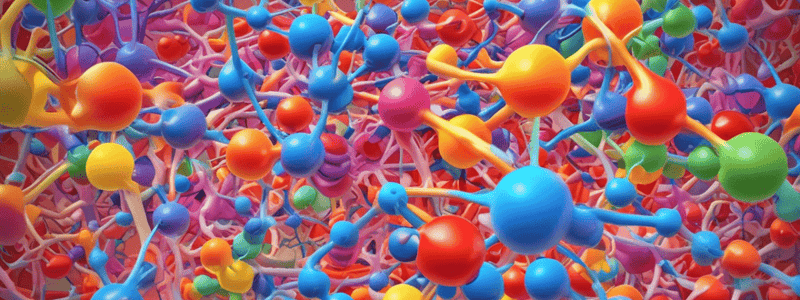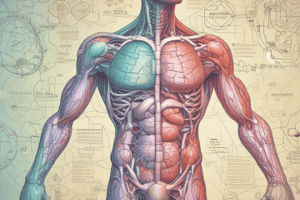Podcast
Questions and Answers
What is the major fate of glucose in animal tissues?
What is the major fate of glucose in animal tissues?
- Direct excretion through the kidneys
- Conversion into fats stored in adipose tissue
- Breakdown in the glycolysis pathway followed by oxidation in the citric acid cycle (correct)
- Conversion into glycogen stored mainly in the liver and muscle
By what means is glycogen stored in vertebrates and starch stored in plants?
By what means is glycogen stored in vertebrates and starch stored in plants?
- Lipid droplets
- Gaseous form
- Intracellular vesicles
- Polymeric storage form (correct)
How is glycogen regulated allosterically and hormonally in vertebrates?
How is glycogen regulated allosterically and hormonally in vertebrates?
- By cortisol and adrenaline
- By growth hormone and estrogen
- By testosterone and progesterone
- By insulin and glucagon (correct)
Where is glycogen primarily stored in the body?
Where is glycogen primarily stored in the body?
Which product is excess glucose mainly converted into in the diet?
Which product is excess glucose mainly converted into in the diet?
What are cytosolic granules mainly composed of in terms of storage?
What are cytosolic granules mainly composed of in terms of storage?
What is the basic structure of amylopectin?
What is the basic structure of amylopectin?
Which polysaccharide has more branching than amylopectin?
Which polysaccharide has more branching than amylopectin?
What is the product obtained by removing a glucose residue from the non-reducing end of a glycogen chain?
What is the product obtained by removing a glucose residue from the non-reducing end of a glycogen chain?
Which enzyme is responsible for breaking down glycogen in muscle and liver?
Which enzyme is responsible for breaking down glycogen in muscle and liver?
What is the function of liver glycogen?
What is the function of liver glycogen?
Why is glycogen important for neurons of the brain and red blood cells?
Why is glycogen important for neurons of the brain and red blood cells?
Why is the oxidation of the anomeric carbon C1 of glucose significant?
Why is the oxidation of the anomeric carbon C1 of glucose significant?
What is the role of glycogen in vigorously contracting muscle?
What is the role of glycogen in vigorously contracting muscle?
Why can't C-1 of glucose be oxidized by Cu2+ in its ring form?
Why can't C-1 of glucose be oxidized by Cu2+ in its ring form?
What is the primary function of the liver in relation to glucose metabolism, compared to muscle?
What is the primary function of the liver in relation to glucose metabolism, compared to muscle?
What is the role of the glucose 6-phosphate transporter (T1) in the liver?
What is the role of the glucose 6-phosphate transporter (T1) in the liver?
What is the role of the glucose and phosphate transporters (T2 and T3) in the liver?
What is the role of the glucose and phosphate transporters (T2 and T3) in the liver?
What is the purpose of the dephosphorylation of glucose 6-phosphate in the liver?
What is the purpose of the dephosphorylation of glucose 6-phosphate in the liver?
Where is the catalytic site of glucose 6-phosphatase located in the liver?
Where is the catalytic site of glucose 6-phosphatase located in the liver?
Which enzyme is responsible for initiating glycogen synthesis?
Which enzyme is responsible for initiating glycogen synthesis?
Which of the following is the activated form of glucose used as a substrate for glycogen synthase?
Which of the following is the activated form of glucose used as a substrate for glycogen synthase?
Which of the following statements about muscle and adipose tissue is true?
Which of the following statements about muscle and adipose tissue is true?
What is the role of the nucleoside triphosphate (NTP) in the formation of a sugar nucleotide?
What is the role of the nucleoside triphosphate (NTP) in the formation of a sugar nucleotide?
Which of the following statements about glycogen synthesis is true?
Which of the following statements about glycogen synthesis is true?
Flashcards are hidden until you start studying





